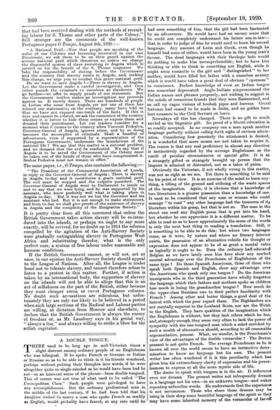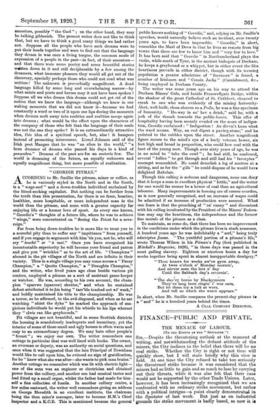A DOUBLE TONGUE. T HERE used to be long ago in
mid-Victorian times a slight distrust among ordinary people of an Englishman who was bilingual. If he spoke French or German or Italian or Russian so as to be able to think in it his friends wondered, perhaps without putting their thoughts into words, if he were altogether quite so single-minded as he would have been had he not—in an innocent sense of the phrase—been double-tongued. This of course was not true of what used to be called " The Cosmopolitan Class." Such people were privileged to have any accomplishment. But the ordinary professional man in the middle of the last century, if he had been told that his daughter wished to many a man who spoke French as readily as English, would probably have feared, at any rate until he
had seen something of him, that the girl had been fascinated by an adventurer. He would have had an uneasy sense that he could not completely understand his future son-in-law— that in order to judge of him he would need to learn his second language. Any amount of Latin and Greek, even though he himself had none of either, would have been in the young man's favour. The dead languages with their theologic halo would do nothing to make him incomprehensible; but to have him thinking or able to think in something not English, while it might seem romantic to the girl and " distinguished " to her mother, would have filled her father with a nameless anxiety which it would have taken a great deal of obvious " openness " to counteract. Perfect knowledge of even an Indian tongue was somewhat deprecated. Anglo-Indians mispronounced the Indian names and phrases purposely, not wishing to suggest in the minds of censorious friends that they were Easternized, and so call up vague visions of hookah pipes and harems. Great: fortunes had ceased to be made in India, and no golden haze lent romance to the Civil Servant on leave.
Nowadays all this has changed. There is no gift so much envied as the linguistic gift. No proof of a liberal education is so readily accepted. In no company can a man speak another language perfectly without calling forth sighs of envious admir- ation. Considering how genuinely the attainment is desired, it is wonderful that more means are not taken to acquire it. The reason is that any real proficiency in almost any direction is instinctively regarded by the average Englishman as the result of peculiar circumstances or special gifts. It is as a strangely gifted or strangely brought up person that the linguist is admired or distrusted, not as a taker of pains.
Obviously the Victorian, if not wholly wrong in this matter, was not as right as we are. Yet there is something to be said for his point of view. It is an exercise of the mind to learn any- thing, a tilling of the ground and utilizing of the waste spaces of the imagination. Again, it is obvious that a knowledge of two literatures is a greater possession than a knowledge of one. It used to be considered that any man or woman who could manage " to read " any other language had the treasures of its literature within his grasp, but that is not so. The man in the street can read any English poem that is put into his hand, but whether he can appreciate it is a different matter. To be able to read so as to know approximately the sense of the words is only the next best thing to reading a translation. Still, it is something to be able to do this; but where two languages come, as it were, by nature and where no literary interest exists, the possession of an alternative vehicle for thought or expression does not appear to be of as great a mental value as logically it ought to be. Does the ordinary half-educated Belgian as we have lately seen him here show any marked mental advantage over the Frenchman or Englishman of the same type ? Do those Spanish Americans, those of them who speak both Spanish and English, show any advantage over the Americans who speak only one tongue ? Do the American immigrants who in the third generation have wholly forgotten the language which their fathers and mothers spoke as children lose much in losing the grandmother tongue ? How much do the upper-class Russians owe to their perfect familiarity with French ? Among other and better things, a good deal of the hatred with which the poor regard them. The Highlanders are not mentally superior to the Lowland Scots, nor are the Welsh to the English. They have qualities of the imagination which the Englishman is without, but they lack others which he has, and, strangely enough, they seem very often to lack the power of sympathy with the one-tongued man which a mind enriched by such a wealth of alternatives should, according to all reasonable argumentation, possess. What, we wonder, is the Frenchman's view of the advantages of the double vernacular ? The Breton peasant is not quite French. The average Frenchman as he is known all over the world seems to have an instinctive deter- mination to know no language but his own. The present writer has often wondered if it is this peculiarity which has given him his extraordinary clarity of expression and his power- lessness to express at all the more mystic side of life.
The desire to speak with tongues is in the air. It influences even our dreams. The present writer not infrequently dreams in a language not his own—in an unknown tongue—and wakes repeating unfamiliar words. He understands that the experience is not uncommon. Those who share these dreams may be using in their sleep some beautiful language of the spirit or they may have some inherited memory of the vernacular of far-off ancestors, possibly " the Gad " ; on the other hand, they may be talking gibberish. The present writer does not like to think that, but we have to think a good many things we had rather not. Suppose all the people who have such dreams were to put their heads together and were to find out that the language they dream in was once a living tongue, the common mode of expression of a people in the past—in fact, of their ancestors— and that there were some poetry and some beautiful stories written down in it and still decipherable by a few among the dreamers, what immense pleasure they would all get out of the discovery, specially perhaps those who could not read what was written ! The unknown is proverbially magnificent. A dead language killed by some long and overwhelming sorrow—by what saints and poets and heroes may it not have been spoken ! Suppose all we who dream this dream could not get rid of the notion that we knew the language—although we knew in our waking moments that we did not know it—because we had constantly a word or two of it upon our lips during the moments when dreams melt away into realities and realities merge again into dreams ; what would be the effect upon the characters of the company of those who felt that the language of their souls was not the one they spoke ? It is an extraordinarily attractive idea, this idea of a spiritual speech, but, alas ! it hampers instead of promoting intercourse. Lionel Johnson said of the Irish poet Mangan that ho was "an alien in the world," "a born dreamer of dreams who passed his days in a kind of penumbra." Dreams of the past are for an esoteric few. The world is dreaming of the future, an equally unknown and equally magnificent thing, but more possible of realization.







































 Previous page
Previous page